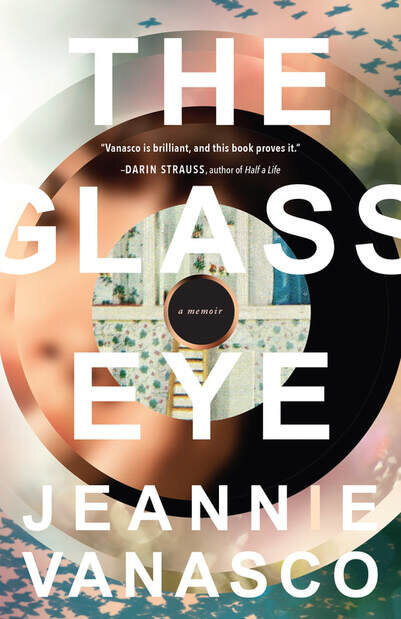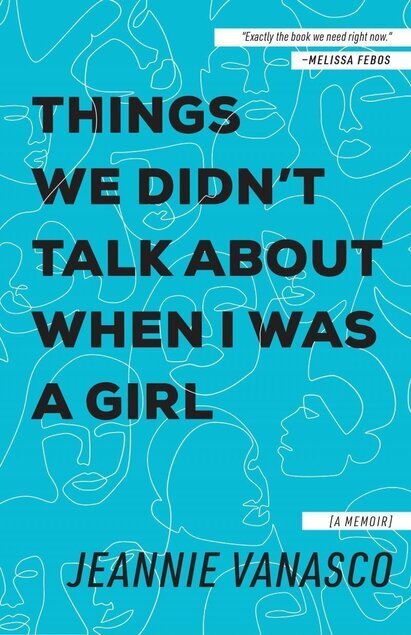A Highlight on Jeannie Vanasco
By Brenna Ebner, written December 2020
from the creative nonfiction summer 2021 series
With two books, The Glass Eye (2017) and Things We Didn’t Talk About When I Was A Girl (2019), Jeannie Vanasco has started and continued important conversations regarding not only herself but women in general. She stands as a strong advocate for those who share in her struggles and speaks for many who have not yet been able to speak out for themselves. Vanasco has done this as a professor, advisor, and mentor to myself and many students at Towson University, and now for others through her writing. Everything from her balance of subjective and objective thinking to her writing style as she examines her experiences is refreshingly honest with a fluid tone as if she were there telling you her story in person. The peeks into her thought process that she shares with us give the reader a taste for the frustration, confusion, and weight Vanasco herself has carried thus far and a sense of the weight many others carry around as well.
Within her first book, The Glass Eye, Vanasco immediately delves into tough topics such as grief and mental health. She battles with the death of her father and the mania that comes with being named after her passed half-sister, but seeing her grapple with these hurdles makes it easy to sympathize even if we haven’t found ourselves in quite the same situation. Her problems, though maybe not immediately like our own, still delve into relatable realms, and Vanasco’s writing on her experience gives those struggling with grief room to feel validated. With this, she normalizes the discussion around the difficulty of letting someone go and struggling with something unseen. We not only see Vanasco lift herself up as she grows through this but also lift others up by creating a space for those who might relate in struggling to grasp their reality. As a topic, that is difficult to put into words; being able to see Vanasco go through it herself helps others to feel seen and heard as they deal with their own mental and emotional afflictions.
Vanasco continues to do this further in her second book, Things We Didn’t Talk About When I Was A Girl, when she opens up about her experience of not only being raped but then confronting her rapist years later. It’s a huge feat that she doesn’t take lightly for herself and what it could mean for others who share her experience, and we see this as she relays moments of reevaluation on her actions to reach out to him. In the wake of the #MeToo movement, Vanasco elaborates further on the impacts and grieving process surrounding this all too common trauma. Her book encourages us to continue the discussion around accountability and accept that healing is not a linear process for most of us. It’s a difficult discussion to be had especially when it is shared with someone so negatively associated with your life, but Vanasco’s fortitude is commendable.
While Vanasco’s books share her own journey through processing grief and trauma, they also lend themselves to others’ journeys through similar hurdles not only in the way she addresses these topics but also in her open writing style. While most authors are very honest in their memoir writings, Vanasco’s transparency goes above as we read moments of her worrying about how we will interpret her “characters” and how she wants to discuss certain topics but struggles to go about it. In this way, Vanasco takes her vulnerability and makes it a strength by breaking down any walls and adding a new layer of trust between her and the reader. In all these ways in which Vanasco brings up, discusses, and processes these topics and issues she becomes an important writer for women and others who may also share in her experiences. Her books test boundaries and limits and help to make what is uncomfortable in society, especially for women, much more comfortable to discuss through her candor. It’s with this that we can find a great appreciation in Vanasco’s writing.
Brenna Ebner is the CNF Managing Editor at Yellow Arrow Publishing and has enjoyed growing as a publisher and editor since graduating from Towson University in May of 2020. In between this time, she has interned with Mason Jar Press and Yellow Arrow and continues to pursue her editing career with freelance work.
*****
Yellow Arrow Publishing is a nonprofit supporting women writers through publication and access to the literary arts. Thank you for supporting independent publishing.


